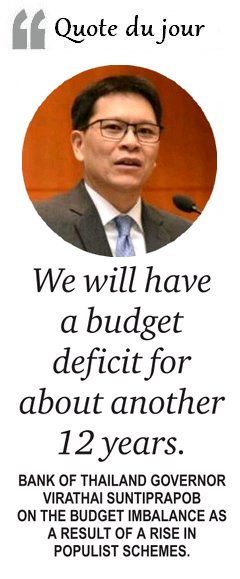
The ongoing election campaign is seeing all competing political parties make ambitious promises to turn Thailand into a welfare state to entice their prospective supporters.
Needless to say, in order to fulfil those promises, the poll winners will have to use enormous amounts of money, which means the country will have to endure a budget deficit for probably another decade as it's difficult for the state to boost income in a short time to achieve a balanced budget, as earlier planned.

Wichit Chantanusornsiri is a senior economics reporter, Bangkok Post.
The country has experienced a budget imbalance for the past 20 years or so.
Interestingly, permanent secretary for finance Prasong Poontaneat likens the ambitious poll promises to a lavish Chinese banquet for the hungry and poor, despite the fact that such welfare schemes are basic human rights.
They should offer ordinary policies that anyone can access -- or, to extend the metaphor, meals we can eat on a daily basis, rather than just something for a special occasion.
Indeed, we need more revenue to introduce welfare packages that account for hundreds of billions of baht. Some may dismiss those expensive policies as populist packages, but they are undeniably necessary.
It's true that each welfare programme is costly, but the offers are relatively modest compared with the pressing demand, especially among those under the poverty line, or even those in the lower middle class.

Take a look at the welfare programme for mothers and children, which is crucial given that low birth rates have adversely affected the demographic balance to the extent that the country has become an ageing society. While Thailand now has more old people to take care of, revenues will dwindle as there are fewer taxpayers to subsidise the required welfare.
To fix the problem, the Democrats are promising an incentive to encourage women to have more babies: If elected, the party said it would make a monthly payment of 1,000 baht until the newborn babies reach the age of eight years.
Meanwhile, Palang Pracharath is offering 3,000 baht a month for pregnant women until they deliver, and another 2,000 baht a month for the newborn until the age of six years. In terms of welfare for the elderly, every party is promising different-sized allowances for people over 6: the Democrats have pledged to give them 1,000 baht a month, Future Forward, 1,800 baht a month, and Pheu Thai 2,000 baht a month.
But those offers, while a huge burden to the country's budget, are still moderate compared to high living costs. They can ease the hardship but not cure the problem. Some may caution that this is populism, but we still need it. If the country were richer, the amount would easily be raised. But it is not possible given the state of the economy, which has seen average growth of 3% over the past decade. We need to achieve at least 4-5% growth if we are to move out of the middle-income trap.
And this is only part of the story.
We should be aware that the more serious problem for Thailand is the inequality gap, as pointed out last year by Credit Suisse (CS) in its Global Wealth Databook.
While embracing welfare programmes is the right policy, it works to be a mid-term remedy. What the country needs is economic reform, decentralised growth and economic development. The regime's flagship Eastern Economic Corridor (EEC) scheme, which aims to raise income levels for people in the East, is not enough.
The country also needs agricultural reform, with the goal of helping people cut production costs, enabling them to produce quality products that meet demand, so they can fetch better prices and eventually enjoy more income. Economic disparity will remain unless we find a way to eradicate poverty from the farm sector.
Going through the campaign policies of each competing party, I cannot see any party bringing about economic reform in concrete terms. I also don't see any party dare to introduce a tax reform policy, which could help remedy inequality.
In reality, the welfare packages that are perceived as lavish banquets are just modest offers that should only be an ordinary, everyday meal for everyone if the country. Yet, I remain hopeful we can have it if we elect the right people, those with vision and decisiveness, who place public good before personal gain.
